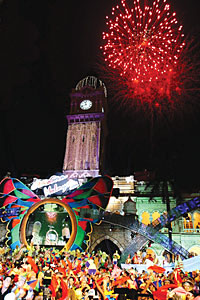 |
This week we celebrate the 52nd anniversary of Malaysia's independence. What in 1957 was an underdeveloped country with a poverty rate of 78 per cent and an annual per capita income of $270 has now emerged as a progressive and prosperous country of 27 million people with a per capita income of $7,000. By Malaysia's National Vision year of 2020, the country aspires to join the ranks of the developed nations.
I have often been asked what made Malaysia tick. There are ten points that made our progress possible:
1. Political stability. The National Front, consisting of 13 political parties representing all the ethnic groups in Malaysia, has been governing the nation since independence. The alliance, painstakingly forged by the forefathers in 1954, was built on an overwhelming spirit of accommodation and moderation. It serves as a unique example of long-term power sharing among multi-ethnic and majority-minority communities and between West Malaysia and the regions of Sabah and Sarawak.
2. Peace, security and social harmony. The country is blessed with visionary leaders. The people haven't felt the need to change a winning combination. Our leaders think out of the box, like the time we rejected the IMF policy prescriptions and successfully adopted home-grown remedies to lift the country out of the 1997 Asian financial crisis. Our approach is being adopted by even developed nations to tackle the current global recession.
3. Enduring inter-ethnic harmony. Instead of creating a melting pot, Malaysia painstakingly weaved a rich cultural mosaic. The plurality of lifestyles this engenders has given rise to an extraordinarily multi-faceted society that stands as an example of how a fragmented multi-ethnic, multi-religious and multi-cultural polity can be welded together in a common nation.
4. Eradication of poverty. Malaysia invested in free primary and secondary education and free health care, and has used its expanding economy to preserve social peace. We adopted pragmatic, globalised economic policies long before globalisation. A strong economy has acted as a glue to bind our people, first, by forging inter-ethnic economic partnerships and second, by giving to every community a share in an expanding economic cake.
6. Peaceful and cooperative social engineering. Malaysia embarked on a pragmatic expansion of opportunities for all. This reduced tensions that flared in 1969 due to the economic gap between the
majority-minority communities.
7. A culture that avoids open confrontation. Behind-the-scenes negotiations and compromises on a whole range of issues are preferred to open confrontation. Malaysia imposes severe controls on mass protests, thereby keeping social conflict off the streets. This may have some human rights implications by western standards but has circumvented the continuous cycle of political and religious violence that bedevils many democratic societies. Trade unions do not resort to bandas and demonstrations to press their demands in Malaysia.
8. Professionalism and competency of the Malaysian civil service in planning and implementing development programs. The government has invested massively in developing human resource capital and upgrading its public delivery capacity.
9. Malaysia as a Muslim country is an exemplar of a moderate, multi-cultural and tolerant society. Secularism and Islam co-exist peacefully despite the rise of political Islam due to the government's balancing of Islamic measures with the broad secular, capitalistic, democratic and globalised features of Malaysia's multi-ethnic and multi-religious society.
10. Women's rights. In the work place, in schools and in universities, women easily outnumber men. About 65 per cent of students in colleges and universities are women.
The World Bank used to categorise the achievement of Malaysia as an 'Asian Miracle'. It's a compliment, but Malaysia's prosperity was not the result of some divine intervention, it was brought about by our
own hard work and sacrifice.
Ilankovan Kolandavelu is ambassador of Malaysia to Nepal. This is an excerpt of a speech he made on his country's national day on 31 August in Kathmandu.



